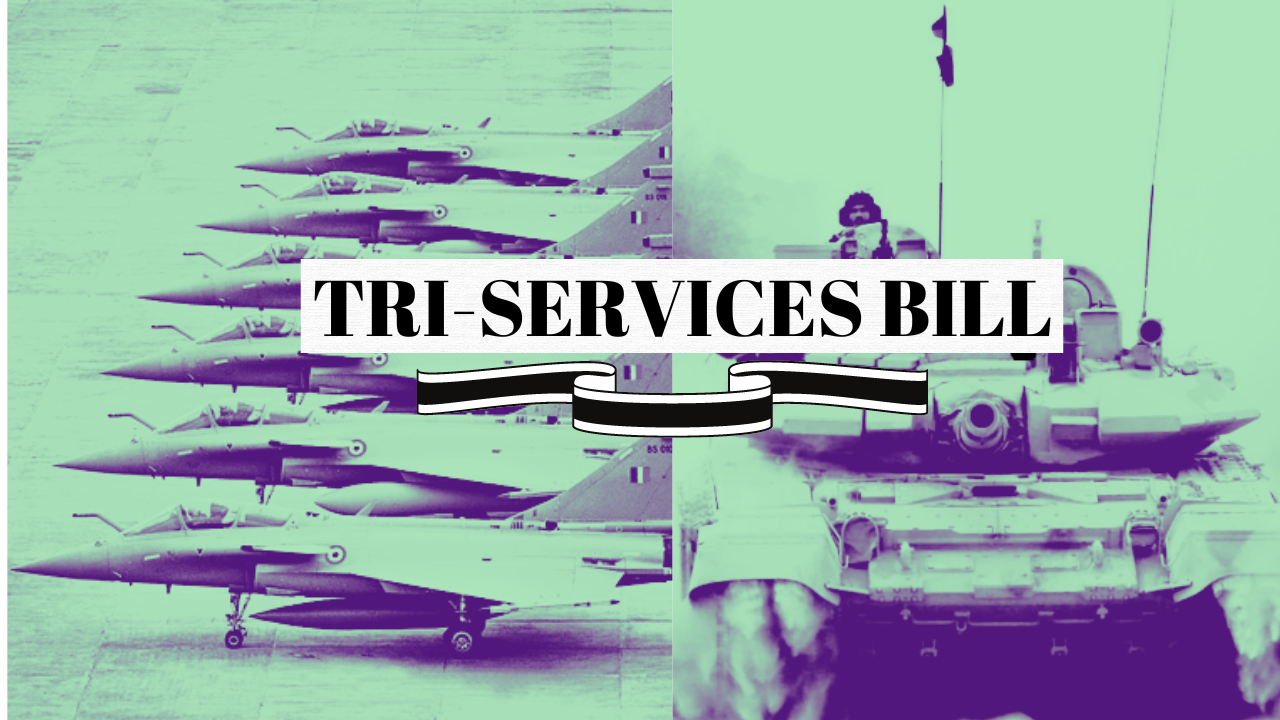The long-awaited ‘Inter-services Organisations (Command, Control and Discipline) Bill,’ commonly known as the Tri-Services Bill has been introduced in Lok Sabha by Defence Minister Rajnath Singh in what is going to be the most radical military reorganization in the country after independence.
The primary objective of the bill is to grant enhanced authority to the Commander-in-Chief or the Officer-in-Command of Inter-services Organisations concerning service personnel subject to the Air Force Act, 1950, the Army Act, 1950, and the Navy Act, 1957. This empowerment is intended to ensure discipline is maintained, duties are efficiently discharged, and all related matters are duly addressed.
“This bill serves two important purposes at once. This is an important step taken in the direction of integration and jointness among the three wings of our armed forces, so that they will be able to face the challenges of the future in a united and integrated manner. It will also help create an environment that will strengthen discipline in our Inter-Services Organisations,” the Defense Minister said in Lok Sabha.
Addressing Challenges in Inter-Services Organisations
A key provision of the Tri-Services bill is the empowerment of the Heads of Inter-services Organisations to exercise effective command, control, and discipline over all personnel serving or attached to their command, even if they belong to different services. This empowerment will not require amending the respective Acts governing the Air Force, Army, and Navy.
According to the Tri-Services Bill explanatory statement, “The proposed Bill will essentially empower the Heads of the Inter-services Organisations to exercise effective command, control and discipline on all personnel of regular Air force, Army and Navy and to persons of other, who are serving in or attached to an Inter-services Organisation, without amending the respective Acts.”
Tri-Services Bill to Streamline Disciplinary Processes
Currently, the disciplinary powers over service personnel of the Air Force, Army, and Navy are limited to officers under their respective Service Acts. As a result, personnel serving in Inter-services Organisations, such as the Andaman and Nicobar Command or Defence Space Agency, face challenges as their respective commanders lack the authority to exercise disciplinary or administrative powers over personnel from other services. This necessitates sending them back to their parent Service units for disciplinary action, causing delays and financial implications.
The Tri-Services bill aims to streamline this process and grant Inter-services Organisations the power to exercise disciplinary and administrative action over all personnel serving within their ranks, irrespective of their original Service affiliation. However, the personnel will continue to be governed by their respective Service Acts for disciplinary or administrative actions when serving in or attached to an Inter-services Organisation.
Proposed Reforms and Empowerment
The proposed system is expected to consist of five joint services commands, namely western, eastern, northern, maritime, and air defense. The central government will have the authority to establish an Inter-Services Organisation, which may encompass a Joint Services Command within its structure.
As a result of the new legislation, the Commander-in-Chief or the Officer-in-Command of Inter-Services Organisations will be empowered to maintain discipline and ensure the proper discharge of duties for all personnel from the Army, Navy, and Indian Air Force (IAF) who serve under their command.
Furthermore, under the new provisions, the head of an Inter-services Organisation will be the Commander-in-Chief or the Officer-in-Command of that particular organization.
Bill To Strengthen India’s Armed Forces Amid Growing Challenges from China and Pakistan
The Chinese People’s Liberation Army (PLA) made significant changes to its military structure in 2016, elevating the rank and status of its western Tibet Military Command. The move was seen by analysts in Beijing as a measure to strengthen the border with India and enhance the command’s capabilities for missions and combat preparedness.
The PLA’s Xinjiang Military Command is also expected to undergo a similar elevation in the future. Both commands fall under the newly established Western Theater Command, which is the largest among the five newly reorganized military regions of the PLA. Chinese State Media reported that this restructuring would enable the command to undertake more combat assignments effectively.
India’s First Integrated Theatre Command (ITC) in Jaipur, announcement likely on August 15
The Southern Western Command and Central Command of the Indian Army have submitted joint study presentations for the ITC establishment. The Indian Air Force’s Central Command and Eastern Command have also submitted reports. The ITC, named Western Command, will oversee the 2300-kilometer-long international border from Jammu and Kashmir to Gujarat and the Line of Control (LoC).
Over four lakh military personnel will operate under this command. The concept of ITC emerged post-Kargil War, with discussions during April’s Commander’s Conference and outline drawn under former CDS General Bipin Rawat’s tenure. Integrated Theatre Commands are already in place in countries like the USA, Russia, and China, however, India’s ITC will be vastly different as it will follow the One Border One Force approach.
Also Read: 200 Rain-Related Deaths Reported in Himachal During Monsoon, Tourism Industry Faces Setback
















